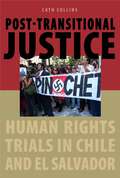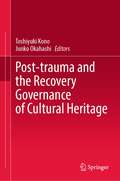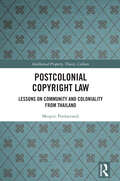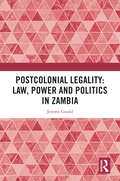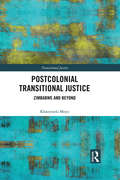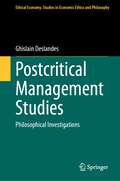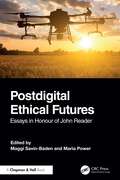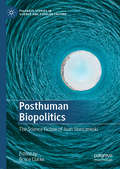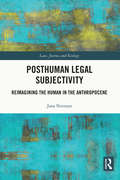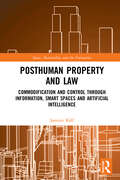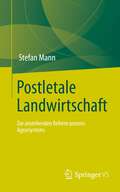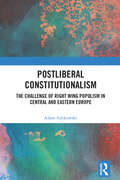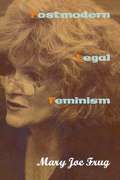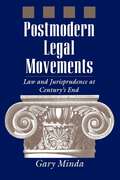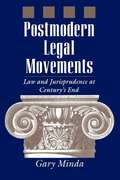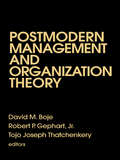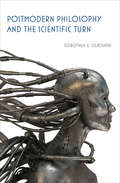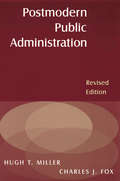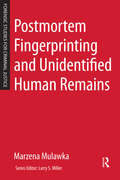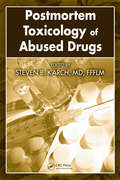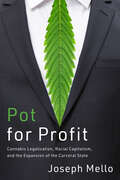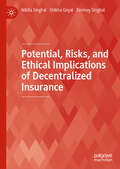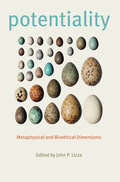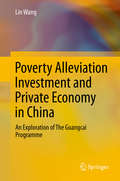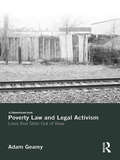- Table View
- List View
Post-transitional Justice: Human Rights Trials in Chile and El Salvador
by Cath CollinsLatin America is still dealing with the legacy of terror and torture from its authoritarian past. In the years after the restoration of democratic governments in countries where violations of human rights were most rampant, the efforts to hold former government officials accountable were mainly conducted at the level of the state, through publicly appointed truth commissions and other such devices. This stage of “transitional justice” has been carefully and exhaustively studied. But as this first wave of efforts died down, with many still left unsatisfied that justice had been rendered, a new approach began to take over. In Post-transitional Justice, Cath Collins examines the distinctive nature of this approach, which combines evolving legal strategies by private actors with changes in domestic judicial systems. Collins presents both a theoretical framework and a finely detailed investigation of how this has played out in two countries, Chile and El Salvador. Drawing on more than three hundred interviews, Collins analyzes the reasons why the process achieved relative success in Chile but did not in El Salvador.
Post-trauma and the Recovery Governance of Cultural Heritage
by Toshiyuki Kono Junko OkahashiThis book successfully represents the indispensable interdisciplinarity of viewpoints by its authors combining legal perspectives with architectural and anthropological approaches. With the observation and analysis presented here, this book is the first to demonstrate research-based governance solutions for cultural heritage within the process of recovering from traumatic events. Its opening statement is that universal international standards are not effective enough for the specific situations of disaster-struck places.A major objective of this monograph is to allow its readers to go through a learning experience, from plural cases where reconstruction of cultural heritage became central to rebuilding a post-disaster society. This book introduces Japan as the most disaster-prone country, with a long history of confronting and overcoming the power of nature, resulting in its unique solutions for cultural heritage resilience and sustainability. But how do leadership and decision making become efficient in times of recovery? Bearing in mind what may be lacking in Japanese practices, this work also presents comparable governance models from other countries which indicate alternative solutions.While a traumatic event may occur within one night, the process of recovery could last for decades. Such disasters also tend to recur. In order that directly affected communities can sustain resilience throughout the long recovery period, and that equally severe social trauma will not be repeated, a continuous, well-maintained governance response is required, whether grounded in local knowledge or national policy frameworks. At the heart of this book is the matter of the reconstruction process involving networks of small and large communities. Each of those has a role that becomes operational through linkages of contacts, the interchange of knowledge and skills, and above all through the sharing of common goals.
Postcolonial Copyright Law: Lessons on Community and Coloniality from Thailand (Intellectual Property, Theory, Culture)
by Mespiti PoolsavasdiThis book appraises postcolonial perspectives to rethink the meaning of copyright and makes suggestions for its future within the global landscape of intellectual property law.Drawing on the experience of Thailand as a case study, a country with a unique yet marginal position in discussions on colonialism, the book offers valuable insights for the international field of copyright law. Thai copyright law emerged in an era when the threat of European colonial powers inspired local ruling elites to embark on a quest for modernisation and establish a modern absolutist state. One can observe similar dynamics in the recent promotion of Thailand’s Creative Economy. Contrary to these top-down developments, the book argues for greater attention to attitudes and practices on the ground. Taking an interdisciplinary approach informed by film studies, area studies, decolonial studies, and legal sociology, the book makes a case to redefine copyright as a community resource.The book will be of interest to researchers in the field of copyright law, postcolonial and decolonial studies, and sociolegal studies.
Postcolonial Legality: Law, Power and Politics in Zambia
by Jeremy GouldThis book interrogates the ideology and practices of liberal constitutionalism in the Zambian postcolony. The analysis focuses on the residual political and governmental effects of an imperial form of power, embodied in the person of the republican president, termed here prerogativism. Through systematic, long-term ethnographic engagement with Zambian constitutionalist activists – lawyers, judges and civic leaders – the study examines how prerogativism has shaped the postcolonial political landscape and limited the possibilities of constitutional liberalism. This is revealed in the ways that repeated efforts to reform the constitution have sidelined popular participation and thus failed to address the deep divide between a small elite stratum (from which the constitutional activists are drawn) and the marginalized masses of the population. Along the way, the study documents the intimate interpenetration of political and legal action and examines how prerogativism delimits the political engagements of elite actors. Special attention is given to the reluctance of legal activists to engage with popular politics and to the conservative ethos that undermines efforts to pursue a jurisprudence of transformational constitutionalism in the findings of the Constitutional Court. The work contributes to the rising interest in applying socio-legal analysis to the statutory domain in postcolonial jurisdictions. It offers a pioneering attempt to deconstruct the amorphous and ambivalent assemblage of ideas and practices related to constitutionalism through detailed ethnographic interrogation. It will appeal to scholars, students and practitioners with an interest in theorizing challenges to political liberalism in postcolonial contexts, as well as in rethinking the methodological toolbox of socio-legal analysis.
Postcolonial Transitional Justice: Zimbabwe and Beyond
by Khanyisela MoyoTransitional justice processes are now considered to be crucial steps in facilitating the move from conflict or repression to a secure democratic future. This book contributes to a deeper understanding of transitional justice by examining the complexities of transition in postcolonial societies. It focuses particularly on Zimbabwe but draws on relevant comparative material from other postcolonial polities. Examples include but are not limited to African countries such as South Africa, Rwanda and Mozambique. European societies such as Northern Ireland, as well as other nations such as Guatemala, are also considered. While amplifying the breadth of the subject of transitional justice, the book addresses the claim that transitional justice mechanisms in postcolonial countries are necessary if the rule of law and the credibility of the country’s legal institutions are to be restored. Drawing on postcolonial legal theory, and especially on analyses of the relationship between international law and imperialism, the book challenges the assumption that a domestic rule of law ‘deficit’ may be remedied with recourse to international law. Taking up the paradigmatic perception that international law is neutral and has fixed rules, it demonstrates how complex issues which arise during postcolonial transitions require a more critical adoption of transitional justice mechanisms.
Postcritical Management Studies: Philosophical Investigations (Ethical Economy #65)
by Ghislain DeslandesThis book is the first of its kind to offer a new definition of contemporary management. It uses Michel Henry’s philosophy and takes the real, sensitive and pathetic subjectivity of individuals as the starting point of the analysis as opposed to the usual large categories of representations; resources; images; and discourses. This book thus proposes to rethink management by insisting on the dialectic of strength and vulnerability; its power of constraint, imitation and imagination; and finally its framework of action situated in a fourfold concern for the self, for people, for institutions and for the environment. These different notions are useful in order to experience a deeper understanding of management that is free from the obsolescence of the distant recommendations of ancient protomanagement and the outdated and dubious prescriptions of the so-called “scientific management”.
Postdigital Ethical Futures: Essays in Honour of John Reader
by Maggi Savin-Baden Maria PowerPostdigital Ethical Futures emerged from the work of the Ethical Futures Network hosted by the William Temple Foundation meeting both online and at Trinity College, Oxford. This book illustrates the research being carried out by some of the members of this network by examining the more practical aspects of the subject of religion and the digital, drawing on a wider range of disciplines and was created in memory of John Reader whose idea the text was, who died suddenly in 2023. This book examines issues of ethics as encountered in both the digital and environmental spheres, and seeks to cross the boundary between philosophy and theology.
Posthuman Biopolitics: The Science Fiction of Joan Slonczewski (Palgrave Studies in Science and Popular Culture)
by Bruce ClarkeThis volume presents the first collection of essays dedicated to the science fiction of microbiologist Joan Slonczewski. Posthuman Biopolitics consolidates the scholarly literature on Slonczewski’s fiction and demonstrates fruitful lines of engagement for the critical, cultural, and theoretical treatment of her characters, plots, and storyworlds. Her novels treat feminism in relation to scientific practice, resistance to domination, pacifism versus militarism, the extension of human rights to nonhuman and posthuman actors, biopolitics and posthuman ethics, and symbiosis and communication across planetary scales. Posthuman Biopolitics explores the breadth and depth of Joan Slonczewski’s vision, uncovering the reflective ethical practice that informs her science fiction.
Posthuman Legal Subjectivity: Reimagining the Human in the Anthropocene (Law, Justice and Ecology)
by Jana NormanThis book provides a reimagining of how Western law and legal theory structures the human–earth relationship. As a complement to contemporary efforts to establish rights of nature and non-human legal personhood, this book focuses on the other subject in the human–earth relationship: the human. Critical ecological feminism exposes the dualistic nature of the ideal human legal subject as a key driver in the dynamic of instrumentalism that characterises the human–earth relationship in Western culture. This book draws on conceptual fields associated with the new sciences, including new materialism, posthuman critical theory and Big History, to demonstrate that the naturalised hierarchy of humans over nature in the Western social imaginary is anything but natural. It then sets about constructing a counternarrative. The proposed ‘Cosmic Person’ as alternative, non-dualised human legal subject forges a pathway for transforming the Western cultural understanding of the human–earth relationship from mastery and control to ideal co-habitation. Finally, the book details a case study, highlighting the practical application of the proposed reconceptualisation of the human legal subject to contemporary environmental issues. This original and important analysis of the legal status of the human in the Anthropocene will be of great interest to those working in legal theory, jurisprudence, environmental law and the environmental humanities; as well as those with relevant interests in gender studies, cultural studies, feminist theory, critical theory and philosophy.
Posthuman Property and Law: Commodification and Control through Information, Smart Spaces and Artificial Intelligence
by Jannice KällThis book analyses the phenomenon of digitally mediated property and considers how it problematises the boundary between human and nonhuman actors. The book addresses the increasingly porous border between personhood and property in digitized settings and considers how the increased commodification of knowledge makes visible a rupture in the liberal concept of the property owning, free, person. Engaging with the latest work in posthumanist and new materialist theory, it shows, how property as a concept as well as a means for control, changes fundamentally under advanced capitalism. Such change is exemplified by the way in which data, as an object of commodification, is extracted from human activities yet is also directly used to affectively control – or nudge – humans. Taking up a range of human engagements with digital platforms and coded architectures, as well as the circulation of affects through practices of artificial intelligence that are employed to shape behaviour, the book argues that property now needs to be understood according to an ecology of human as well as nonhuman actors. The idea of posthuman property, then, offers both a means to critique property control through digital technologies, as well as to move beyond the notion of the self-owning, object-owning, human. Engaging the most challenging contemporary technological developments, this book will appeal to researchers in the areas of Law and Technology, Legal Theory, Intellectual Property Law, Legal Philosophy, Sociology of Law, Sociology, and Media Studies.
Postletale Landwirtschaft: Zur anstehenden Reform unseres Agrarsystems
by Stefan MannEs gibt viele Bücher auf dem Markt, die uns erklären, warum wir aufhören sollten, Fleisch zu produzieren und zu essen. Dieses Buch dagegen erklärt, warum wir aufhören werden, Fleisch zu produzieren und zu essen. Und was sich dadurch in der Landwirtschaft verändern wird.Tierrechtler verweisen gerne auf die Abschaffung der Sklavenhaltung und zeigen, worin die vielen Parallelen zur Befreiung landwirtschaftlicher Nutztiere liegen. Leider erklären sie nicht, warum die Sklavenhaltung zwischen 1833 und 1987 in jedem Land der Welt, die Tierproduktion aber in keinem Land der Welt abgeschafft wurde, sondern der globale Fleischkonsum weiter wächst. Es gilt also einerseits zu erklären, warum das Unbehagen immer mehr Konsumenten mit dem, was die einen Wertschöpfungskette, die anderen Tötungsmaschinerie nennen, nicht zu einem Paradigmenwechsel geführt hat. Und warum derzeit die Voraussetzungen dafür geschaffen werden, damit sich dies ändert.So füllt «Postletale Landwirtschaft» die Lücke zwischen tierethischen Abhandlungen und der Fülle «wertfreier» agrar- und umweltwissenschaftlicher Literatur zur Dynamik und den Auswirkungen des Fleischkonsums. Das Buch stellt dar, welche ethischen und welche ökologischen Probleme zwangsläufig zu einer Transformation der Landwirtschaft führen werden. Höchstwahrscheinlich einer Landwirtschaft, zu der das Töten von Tieren nicht mehr gehören wird.
Postliberal Constitutionalism: The Challenge of Right Wing Populism in Central and Eastern Europe
by Adam SulikowskiThis book addresses recent changes in Central and Eastern Europe in order to critically consider the impact of illiberal conservatism on constitutionalism. Right-wing populism and the illiberal constitutionalism of Central and Eastern Europe have challenged both the dominant views of legal scholars and those elements of the legal mainstream that appeared to be firmly entrenched and resistant to change. But, as this book demonstrates, in practical terms, the anti-liberal right has made use of critical methods that were originally conceived as tools for use in emancipatory and left-wing action, absorbing and utilizing a great many of the ideas associated with critical jurisprudential thought. In short, this book maintains, conservative illiberalism has taken over the role that postmodernism could have played: the role of a ‘jester discourse’ relativizing the certainties and finality of liberal democracy. As the book argues, however, what this connection reveals is the necessity of a legal and political response that does not simply and hysterically reaffirm the former liberal hegemony. Rather, drawing on Foucault and post-Marxism, it articulates a concept of agonistic democracy that aims to shift the center of gravity in constitutional discourse away from any naive liberal faith in the nonpolitical. This book will appeal to constitutional lawyers, as well as to legal and political theorists with interests in contemporary populism and liberal thought.
Postmodern Legal Feminism
by Mary Joe FrugA collection of eight essays by Mary Joe Frug, published posthumously. First Published in 1993. Routledge is an imprint of Taylor & Francis, an informa company.
Postmodern Legal Movements: Law and Jurisprudence At Century's End
by Gary MindaA wide-ranging and comprehensive survey of modern legal scholarship and the evolution of law in AmericaWhat do Catharine MacKinnon, the legacy of Brown v. Board of Education, and Lani Guinier have in common? All have, in recent years, become flashpoints for different approaches to legal reform. In the last quarter century, the study and practice of law have been profoundly influenced by a number of powerful new movements; academics and activists alike are rethinking the interaction between law and society, focusing more on the tangible effects of law on human lives than on its procedural elements. In this wide-ranging and comprehensive volume, Gary Minda surveys the current state of legal scholarship and activism, providing an indispensable guide to the evolution of law in America.
Postmodern Legal Movements: Law and Jurisprudence At Century's End (Open Access Lib And Hc Ser.)
by Gary MindaWhat do Catharine MacKinnon, the legacy of Brown v. Board of Education, and Lani Guinier have in common? All have, in recent years, become flashpoints for different approaches to legal reform. In the last quarter century, the study and practice of law have been profoundly influenced by a number of powerful new movements; academics and activists alike are rethinking the interaction between law and society, focusing more on the tangible effects of law on human lives than on its procedural elements. In this wide-ranging and comprehensive volume, Gary Minda surveys the current state of legal scholarship and activism, providing an indispensable guide to the evolution of law in America.
Postmodern Management and Organization Theory
by David Boje Dr Robert P Gephart Tojo Joseph ThatchenkeryThis thought-provoking critique of postmodern theory provides an overview of issues as they relate to management and organization theory and its history, and assembles a variety of important works on postmodern philosophy - including feminist and cultural postmodern philosophies. Addressing the future of the postmodern influence on management and organization theory and method, the book also establishes an agenda for future research.
Postmodern Philosophy and the Scientific Turn
by Dorothea E. OlkowskiA groundbreaking, interdisciplinary approach to the study of consciousness: &“Beautifully written, engaging throughout, and captivating&” (Claire Colebrook, The Pennsylvania State University). What can come of a scientific engagement with postmodern philosophy? Some scientists have claimed that the social sciences and humanities have nothing to contribute, except perhaps peripherally, to their research. Dorothea E. Olkowski shows that mathematics itself—the historic link between science and philosophy—plays a fundamental role in the development of the worldviews that drive both fields. Focusing on language, its usage and expression of worldview, she develops a phenomenological account of human thought and action to explicate the role of philosophy in the sciences. Olkowski proposes a model of phenomenology, both scientific and philosophical, that helps make sense of reality and composes an ethics for dealing with unpredictability in our world.
Postmodern Public Administration
by Hugh T Miller Charles J FoxThis widely acclaimed work provides a lively counterbalance to the standard assessment-measurement-accountability prescriptions that have made showing you did your job more important than actually doing it. Now extensively revised, it articulates a postmodern theory of public administration that challenges the field to redirect its attention away from narrow, technique-oriented scientism, and toward democratic openness and ethics. The authors incorporate insights from thinkers like Rorty, Giddens, Derrida, and Foucault to recast public administration as an arena of decentered practices. In their framework, ideographic collisions and everyday impasses bring about political events that challenge the status quo, creating possibilities for social change. "Postmodern Public Administration" is an outstanding intellectual achievement that has rewritten the political theory of public administration. This new edition will encourage everyone who reads it to think quite differently about democratic governance.
Postmortem Fingerprinting and Unidentified Human Remains
by Marzena MulawkaFingerprint identification is the most efficient, rapid, and cost-effective forensic identification modality. Postmortem Fingerprinting and Unidentified Human Remains is a consolidated and thorough guide to the recovery, identification, and management of unidentified postmortem fingerprint records - topics from postmortem fingerprint processing to database submission and case management are discussed. Additionally, a postmortem processing workflow is described, which delineates various basic and advanced fingerprint recovery techniques used to acquire examination-quality records. Furthermore, Postmortem Fingerprinting and Unidentified Human Remains discusses the complexity of antemortem fingerprint databases and how to access each database for humanitarian purposes, bringing a modern value perspective to the topic.
Postmortem Toxicology of Abused Drugs
by Steven B. KarchPostmortem Toxicology of Abused Drugs considers the role of toxicology in death investigation and gives practical insights on conducting toxicology tests and completing the toxicology report. It explains chain of custody; specimen collection and security; sampling of blood, urine, bile, and vitreous humor; and selection of post-mortem specimens. The book analyzes various testing procedures, discusses methods and strategies for analysis, covers quality assurance protocols and controls, and instructs in the proper interpretation of postmortem drug tests. Heavily referenced and containing several tables, figures, and useful appendices, this book is a handy reference for forensic scientists and medical examiners involved with death inves
Pot for Profit: Cannabis Legalization, Racial Capitalism, and the Expansion of the Carceral State (The Cultural Lives of Law)
by Joseph MelloThe United States has experienced a dramatic shift in attitudes towards cannabis use from the 1970s, when only 12% of Americans said that they thought that cannabis should be legal, to today. What once had been a counterculture drug supplied for the black market by socially marginal figures like drug smugglers and hippies has become a big business, dominated by a few large corporations. Pot for Profit, traces the cultural, historical, political, and legal roots of these changing attitudes towards cannabis. The book also showcases interviews with dispensary owners, bud tenders, and other industry employees about their experience working in the legal cannabis industry, and cannabis reform activists working towards legalization. Mello argues that embracing the profit potential of this drug has been key to the success of cannabis reform, and that this approach has problematic economic and racial implications. The story of cannabis reform shows that neoliberalism may not be an absolute barrier to social change, but it does determine the terrain on which these debates must occur. When activists capitulate to these pressures, they may make some gains, but those gains come with strings attached. This only serves to reinforce the totalizing power of the neoliberal ethos on American life. The book concludes by meditating on what, if anything, can be done to move the cannabis legalization movement back onto a more progressive track.
Potential, Risks, and Ethical Implications of Decentralized Insurance (Technology, Work and Globalization)
by Nikita Singhal Shikha Goyal Tanmay SinghalThis book provides a comprehensive and in-depth exploration of decentralized insurance, its impact on the insurance sector, its ethical implications, and its potential to transform the insurance industry. It explores the underlying technologies, such as blockchain, smart contracts, and DApps, that drive the decentralization of insurance services. Additionally, it examines various decentralized insurance models, including Peer-to-Peer, Parametric, and On-Demand Insurance, and their benefits and ethical considerations. It also addresses the challenges and opportunities for innovation and sustainability in the context of decentralized insurance. Its didactic approach, global perspective, and forward-looking vision will provide readers with valuable knowledge to grasp decentralized insurance's complexities, potentials, and challenges, making it a valuable resource for academics, industry professionals, policymakers, and blockchain enthusiasts.
Potentiality: Metaphysical and Bioethical Dimensions
by John P. LizzaClassic articles and newly commissioned chapters analyze the nature of potentiality in bioethics.What is the moral status of humans lacking the potential for consciousness? The concept of potentiality often tips the scales in life-and-death medical decisions. Some argue that all human embryos have the potential to develop characteristics—such as consciousness, intellect, and will—that we normally associate with personhood. Individuals with total brain failure or in a persistent vegetative state are thought to lack the potential for consciousness or any other mental function. Or do they?In Potentiality John Lizza gathers classic articles alongside newly commissioned chapters from leading thinkers who analyze the nature of potentiality in bioethics, a concept central to a number of important debates. The contributors illustrate how considerations of potentiality and potential persons complicate the analysis of the moral consideration of persons at the beginning and end of life. A number of works explicitly uncover the Aristotelian background of the concept, while others explore philosophical issues about persons, dispositions, and possibility. The common assumption that potentiality is intrinsic to whatever has the potentiality is challenged by a relational view of persons, an extrinsic account of dispositions, and attention to how extrinsic factors affect realistic possibilities. Although potentiality has figured prominently in bioethical literature, it has not received a great deal of logical, semantic, and metaphysical analysis in contemporary philosophical literature. This collection will bring these thorny philosophical issues to the fore. Incorporating cutting-edge research on the topic of potentiality, this thought-provoking collection will interest bioethicists, philosophers, health care professionals, attorneys engaged in medical and health issues, and hospital and governmental committees who advise on policy and law concerning issues at the beginning and end of life.
Poverty Alleviation Investment and Private Economy in China
by Lin WangThis book explores the mechanisms and significance of China's private economy participating in poverty alleviation. By basing its analysis on theories of development economics and public economics, the book stresses practical significance and abandons unreasonable assumptions. It uses a systematic set of statistical analysis tools and descriptive statistics to provide a multidimensional and highly visual format. Beyond the traditional qualitative comparison of countries, it also introduces quantitative comparison. Considering the increasing concern and curiosity about China's booming economy and rising private sector, the book is highly topical, offering readers theoretical insights into China's poverty alleviation mechanisms and essential information on the role played by the private economy in social and economic development.
Poverty Law and Legal Activism: Lives that Slide Out of View
by Adam GeareyLinking critical legal thinking to constitutional scholarship and a practical tradition of US lawyering that is orientated around anti-poverty activism, this book offers an original, revisionist account of contemporary jurisprudence, legal theory and legal activism. The book argues that we need to think in terms of a much broader inheritance for critical legal thinking that derives from the social ethics of the progressive era, new left understandings of "creative democracy" and radical theology. To this end, it puts jurisprudence and legal theory in touch with recent scholarship on the American left and, indeed, with attempts to recover the legacies of progressive era thinking, the civil rights struggle and the Great Society. Focusing on the theory and practice of poverty law in the period stretching from the mid-1960s to the present day, the book argues that at the heart of both critical and liberal thinking is an understanding of the lawyer as an ethical actor: inspired by faith or politics to appreciate the potential and limits of law in the struggle against economic inequality.
